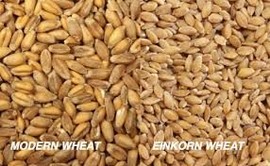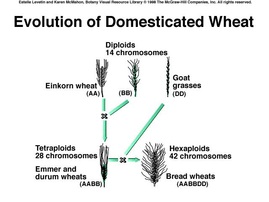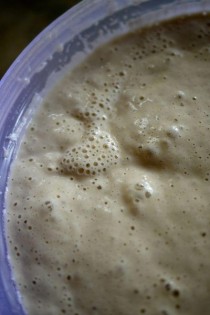We have several different topics within our section on healthy eating:
The truth about wheat and gluten
Whole grains help prevent cancer and diabetes. Not long ago, all wheat was real "Einkorn" wheat and most breads were sourdough. Einkorn is an ancient grain, the first wheat. It's rich in flavor, and as is the case with most older heirloom varieties, it's also richer in vitamins and minerals than its modern cousin. Unlike modern wheat, the gluten molecule found in traditional Einkorn flour is often well tolerated by people who are otherwise gluten intolerant.
Einkorn has never been hybridized like the modern 'wheat' which is really not even wheat at all. Really it is a form of spelt that has been hybridized so many times since the 1800's, lately many times by very destructive chemical processes and the human body hasn't been able to adapt to digest it properly. Einkorn is a "hulled" wheat, whereas modern wheats are not. The hull protects the grain from chemical contamination and insects making it cleaner, easier to grow organically! Einkorn wheat has only 14 chromosomes while modern wheat has 42, which is easier on our digestion.
(Information gained from here)
Einkorn, which is lower in gluten than standard 'wheat', reportedly contains:
- 2 times more Vitamin A (natural retinol equivalent) than modern wheats (healthy for eyes, reproductive organs and prevention of many cancers!);
- 3 to 4 times more lutein than modern wheats (very good for the eyes!);
- 4-5 times more riboflavin than modern wheats (antioxidant that slows aging!);
- 3 to 4 times more beta-carotene than modern wheats (boosts immunity, helps prevent cancer and heart disease, and good for the eyes!).
Wheat May Promote Diabetes Through Disturbing Gut Flora
By: Sayer Ji, Green Medinfo
While it is not a commonly understood concept that wheat or gluten can cause blood sugar disorders, and certainly not as serious as type 1 diabetes, which involves the autoimmune destruction of the insulin producing beta cells in the pancreas, a sizable body of animal and human data points to exactly this causal link. Gluten, after all, is well known for adversely affecting gut health, and in the case of celiac disease, destroying the absorptive surface of the intestine through a hallmark autoimmune triggered process. In many ways, gluten opens up a 'pandora's box' of autoimmunity by both triggering intestinal permeability – so-called 'leaky gut' – as well as providing over 23,000 unique, digestion resistant polypeptides which are capable of infiltrating the body causing systemic inflammation and the loss of immunological self-tolerance, i.e. the ability to distinguish self from non-self. Adding to this increasingly dismal picture of what was once considered the ultimate poster child for 'healthy food,' a new study published in the PloS One may have uncovered a 'missing' link in understanding how wheat exerts its toxic effects.
Mayo Clinic researchers sought to elucidate the mechanism at play within the long observed link in both animal and human studies between dietary gluten and the pathogenesis of type 1 diabetes (T1D), focusing on the role of the gut microflora in mediating its diabetes promoting properties. In the new study titled, "Low Incidence of Spontaneous Type 1 Diabetes in Non-Obese Diabetic Mice Raised on Gluten-Free Diets Is Associated with Changes in the Intestinal Microbiome",[ii] they sought to confirm "whether changes in the intestinal microbiome could be attributed to the pro- and anti-diabetogenic effects of gluten-containing and gluten-free diets, respectively." They noted recent research showing that intestinal microflora have a major influence on the incidence of T1D, and theorized that since "diet is known to shape the composition of the intestinal microbiome," they might find an important link by testing changes in the gut flora of animals fed either gluten or gluten-free diets.
The study design was described as follows: "NOD [non-obese diabetic] mice were raised on gluten-containing chows (GCC) or gluten-free chows (GFC). The incidence of diabetes was determined by monitoring blood glucose levels biweekly using a glucometer. Intestinal microbiome composition was analyzed by sequencing 16S rRNA amplicons derived from fecal samples."
The researchers observed the following results: "First of all, GCC-fed [gluten-containing chow fed] NOD mice had the expected high incidence of hyperglycemia [elevated blood sugar] whereas NOD mice fed with a GFC [gluten-free chows] had significantly reduced incidence of hyperglycemia. "Secondly, when the fecal microbiomes were compared, Bifidobacterium, Tannerella, and Barnesiella species were increased (p = 0.03, 0.02, and 0.02, respectively) in the microbiome of GCC [gluten-containing chow fed] mice, where as Akkermansia species was increased (p = 0.02) in the intestinal microbiomes of NOD [non-obese diabetic] mice fed GFC [gluten-free chows]. "Thirdly, both of the gluten-free chows that were evaluated, either egg white based (EW-GFC) or casein based (C-GFC), significantly reduced the incidence of hyperglycemia."
The researchers found that when they added back gluten to the gluten-free diet group the following occurred:
- Diabetic symptoms returned
- Akkermansia species were reduced
- Bifidobacterium, Tannerella, and Barnesiella increased
According to the study, these observed changes suggest "that the presence of gluten is directly responsible for the pro-diabetogenic effects of diets and it determines the gut microflora." They observed a gluten free "diabetes inhibitory" diet resulted in altering the non-obese diabetic mice's microflora to reflect a "richer" bacterial profile. Conversely, they observed that a gluten-containing diet resulted decreases in a genus of gastrointestinal microbiotia (Akkermansia) previously shown to protect against the development of type 1 diabetes. Since the immune system develops and its function is maintained in large part through its relationship with the microflora in our gut, it makes sense that gluten's promotion of autoimmune disorders, which include celiac disease and type 1 diabetes to name but a few, could be connected to the way this complex of proteins adversely affects the diversity of gastrointestinal microflora. The researchers concluded: "Our novel study thus suggests that dietary gluten could modulate the incidence of T1D [type 1 diabetes] by changing the gut microbiome."
This new study follows closely in the wake of another recent Plos study that found the alcohol soluble portion of gluten known as gliadin promotes weight gain and pancreatic beta cell hyperactivity – a potential contributor to type 2 diabetes (marked by excessive and/or elevated insulin) and a precursor to type 1 diabetes. Given the increasingly dense body of research indicating wheat has diabetogenic properties the time has come to recognize that many of the most common ailments that afflict our species today are a direct result of the consumption of popular foods such as wheat, which are mistakenly believed to be safe and wholesome.
Ancient solution to a modern wheat problem? Einkorn may provide a new grain alternative for those suffering from gluten intolerance.
Article below can be found at can be found here
Over the last several years, many who value health are becoming aware of the dangers of gluten, especially when it's consumed as modern wheat. Severe digestive distress, celiac disease, rheumatoid arthritis, ADHD, multiple sclerosis and even mental illnesses such as schizophrenia are just a few of the maladies linked to the protein in wheat, barley and rye. As reactions continue to escalate at a staggering rate in the United States, both researchers and private organizations are beginning to take a look at ancient cereal grains as a possible solution to our wheat troubles.
Commonly known as einkorn, Triticum monococcum is an intriguing heritage grain that was harvested as early as 16,000 BCE. Cultivation began during the Neolithic Era and early Bronze Age (10,000-4,000 BCE) and continued into the early 20th century, when much of einkorn production was replaced by hybridized, high-yield, pest-resistant strains of what we now recognize as modern wheat. Einkorn is nutritionally superior to hard red wheat, supplying higher levels of protein, fat, phosphorous, potassium, pyridoxine and beta-carotene. It's also much lower in problematic gluten. Enthusiasts of einkorn believe it tastes better, lending a "light rich taste which left common bread wheat products tasteless and insipid by comparison," according to the ASHS publication Progress in New Crops. What's really garnering attention, however, is that einkorn may be nontoxic to individuals suffering from gluten intolerance.
Safe for celiacs?
Several studies indicate that einkorn could provide a new grain option for the millions with celiac disease and gluten sensitivity. In one experiment, intestinal biopsies were taken from 12 treated celiac patients, as well as 17 control subjects, and cultured with either standard bread gliadin or einkorn gliadin for 24 hours. At the end of the testing, researchers concluded, "[This study shows] a lack of toxicity of T. monococcum gliadin in an in vitro organ culture system, suggesting new dietary opportunities for celiac patients."
Another study involved 12 celiac patients who had been adhering to a gluten-free diet for at least one year. In a single-blind, cross-over investigation, each participant was given einkorn wheat, rice or amygluten on days 0, 14 and 28. At the end of the study, researchers noted that, although "[n]o definite conclusion can be drawn on the safety of Tm [einkorn]. . . Tm was, however, well tolerated by all patients providing the rationale for further investigation on the safety of this cereal for CD patients."
Additionally, Norwegian researchers have identified a T-cell stimulatory gluten peptide in modern wheat which triggers an autoimmune response in people sensitive to the protein. Alpha-gliadin genes on wheat chromosome 6D appear to be the culprit. Of particular interest to individuals with celiac disease is that einkorn wheat does not contain this troublesome peptide. Further research is needed, but preliminary findings hold promise for those suffering from gluten reactions.
Sensitive to gluten? Traditional sourdough offers a unique solution to bread woes
Check out this very recent link from naturalnews.com (11/6/13)
"Jack Bezian of Bezian's Bakery in Santa Monica, California, has an eye-catching sign behind his loaves of bread, stating: "Roman soldiers had only sourdough bread to get protein." But this is
only part of the story. For those who suffer from gluten intolerance or celiac disease, Jack's naturally fermented bread is surprisingly easy to digest. Interestingly, several studies have also found
true sourdough to be well tolerated by individuals sensitive to gluten.
Celiac disease is an autoimmune disorder triggered by consuming the protein in wheat, barley and rye - otherwise known as gluten. If a celiac ingests this protein, the immune system mistakenly
attacks the villi in the small intestine, causing a cascade of health issues, including leaky gut syndrome, malnutrition, lactose intolerance, osteoporosis, neurological disorders and cancer.
Under normal circumstances, it's necessary for individuals with a gluten sensitivity to completely eliminate the troublesome offender from their diet. However, two small studies involving sourdough
bread give hope to the millions who believe they need to swear off gluten containing grains forever.
A European study of 17 celiac patients who consumed sourdough bread had an intriguing outcome. When the volunteers ingested a specialized sourdough containing lactobacilli culture, none of the
participants exhibited any negative effects of intestinal permeability. The bread was made with 30 percent wheat flour and a combination of oat, millet and buckwheat flours. The researchers
concluded, "These results showed that a bread biotechnology that uses selected lactobacilli, nontoxic flours, and a long fermentation time is a novel tool for decreasing the level of gluten
intolerance in humans."
Similarly, another study found that "individuals with celiac disease who ate specially prepared sourdough wheat bread over the course of 60 days experienced no ill effects," writes Tasha Gerken in
"Celiacs Can Say Yes to Sourdough Bread." Read more about the testing protocol #1 below.
Research published in Applied and Environmental Microbiology offers a possible explanation. Scientists discovered that, when wheat bread is thoroughly fermented, gluten content drops from
approximately 75,000 ppm to 12 - a level technically considered gluten-free. The key is a long fermentation process... When bread is leavened naturally with lactobacilli, it transforms wheat flour
into a nutrient-rich edible which is abundant in vitamins B, C and E, bioavailable protein, fatty acids and minerals. With true sourdough, bone and tooth destroying phytates are minimized..."
Sourdough fermentation is much better for our body!
Just as the souring process helps to increase the flavor of grains, it also helps to make improve the availability of trace minerals in those grains as well. Even further, grains and flours prepared according to traditional sourdough methods are also richer in folate than grains, flours, doughs and batters not subject to sourdough fermentation.The traditional process of sourdough fermentation not only yields beautiful breads, biscuits and pastries, but it also enhances the nutrient profile of grains - deactivating naturally occurring antinutrients while also increasing folate content and the availability of minerals which is why most of the grains our family eats are, invariably, soaked or soured, but not sprouted.
"Grains contain two known toxins of the benzoxazinoid class, abbreviated DIMBOA and DIBOA (I'll spare you the chemical name). These toxins induce mutations in DNA and RNA, which can cause cell death or, worse, induce a cancer cell. DIMBOA and DIBOA offer a potent defense against pests and are produced in the highest quantities during the plants most vulnerable time, sprouting. Unfortunately, sprouted grains which contain the greatest amount of these toxins, have been promoted as a health food"!!
(Above paragraph is from: here)
While "gluten free" or "grain free" is the drastic route many are taking now days because of the problems modern hybridized & GMO wheat and modern leavening has caused, remember that properly
prepared grains and breads have nourished many generations of healthy families across the globe. The following 2 quotes are excerpts from a study undertaken to find out whether "Sourdough Bread Made
from Wheat and Nontoxic Flours and Started with Selected Lactobacilli Is Tolerated in Celiac Sprue Patients":
"...After 24 hours of fermentation, wheat gliadins and low-molecular-mass, alcohol-soluble polypeptides were hydrolyzed almost totally..."
"...These results showed that a bread biotechnology that uses selected lactobacilli, nontoxic flours, and a long fermentation time is a novel tool for decreasing the level of gluten intolerance in humans."
(See link here for this report)
Dare to try Our daily Bread bakery's ultimately healthy and delicious, 100% freshly ground organic whole Einkorn genuine sourdough bread cultured/fermented for 24 hours! We ferment for at least 24 hours right after grinding the wheat, then bake it.
We don't recommend this bread to celiac patients as everyone must test for themselves. But we're thrilled and confident that this combination of using the already lower gluten organic Einkorn with this long natural fermentation sourdough very greatly reduces the problems! If only folks would start eating wisely before they develop gluten intolerance or celiac disease!
Call or email Stephanie Heiden, 850 208-4968, 698-6248 ourdailybreadbakery1@gmail.com
More important reading:
Hydrolyzed wheat products safe for celiacs
The importance of properly preapred grains
Can celiacs eat true sourdough bread?
200 clinically confirmed reasons not to eat modern wheat
The critical role of wheat lectins in human disease
Wheat contains many potentially harmful proteins
Lack of toxity in Einkorn gliadin
23k potentailly harmful proteins in modern wheat
Japan GE wheat genetic pollution









